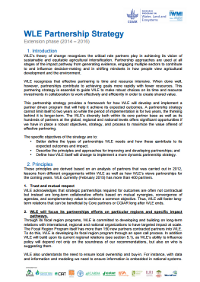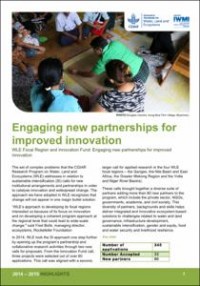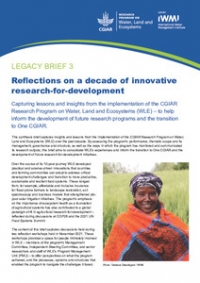The set of complex problems that the CGIAR Research Program on Water, Land and Ecosystems (WLE) addresses in relation to sustainable intensification (SI) calls for new institutional arrangements and partnerships in order to catalyse innovation and widespread change. The approach we have adopted in WLE recognizes that change will not appear in one magic bullet solution.
“WLE’s approach to developing its focal regions interested us because of its focus on innovation and on developing a coherent program approach at the regional level that could lead to wide-scale change," said Fred Boltz, managing director, ecosystems, Rockefeller Foundation.
In 2014, WLE took the SI approach one step further by opening up the program’s partnership and collaborative research activities through two new calls for proposals. From the Innovation Fund call, three projects were selected out of over 60 applications. This call was aligned with a second, larger call for applied research in the four WLE focal regions – the Ganges, the Nile Basin and East Africa, the Greater Mekong Region and the Volta and Niger River Basins).
These calls brought together a diverse suite of partners adding more than 80 new partners to the program, which include the private sector, NGOs, governments, academia and communities. This diversity of partners, backgrounds and skills helps deliver integrated and innovative ecosystem-based solutions to challenges related to water and land governance, infrastructure development, sustainable intensification, gender and equity, food and water security and livelihood resilience.
Key stats:
| Number of applications | Number Accepted | New Partners |
| 345 | 33 | 80 |
The Innovation Fund
WLE introduced the Innovation Fund to support impact-driven research that features an ecosystems-based approach. The fund, which was implemented through an open and competitive call, encourages integrated, innovative research that cuts across regions to develop tools, methods and analysis that support equitable ecosystems-based development and investments.
The three funded projects for the next two years explore and detail effective new processes, systems and channels for WLE to engage with public, private and non-profit decision-makers. All three projects feature innovative international and local partners.
Andrew Noble, WLE Program Director, highlighted the importance of the Innovation Fund to WLE: “We are excited about these proposals because they represent a portfolio of work that will contribute to our knowledge and understanding of the critical importance of WLE’s ecosystems approach in transforming our food production systems. We see the innovation fund proposals as adding value to our emerging focal region programs by supporting and complementing ongoing and future initiatives that are being planned.”
The Focal Regions
In order to continue momentum built by the CGIAR Challenge Program on Water and Food and other key WLE related projects in specific regions, WLE initiated its focal region program in the Greater Mekong, Ganges, Nile River Basin and East Africa and Volta and Niger River Basins.
These programs are expected to provide sustainable solutions to large-scale regional and national investments in water and land within an ecosystem services framework. To do this, WLE initiated an open call to foster the development of new innovative partnerships.
Each focal region went through a transparent and independent process to select a number of strategic projects to help fulfill specific regional objectives. The call for proposals incorporated some specific requirements designed to shape the research towards WLE’s programmatic aims: national capacity development, regional engagement and a focus on gender and ecosystem services. These included the need for more than three partners on each call and a partner could lead only one proposal – but could partner on multiple projects. In addition, at least 40% of funding had to go to national or regional partners and at least 20% towards gender related research. Finally each proposal had to address a component of the regional challenges, focus on the identified topics and fit within WLE’s ecosystem framework.
Almost 300 proposals were received from international, regional and national organizations across the four regions (Mekong 104; Nile 80, Volta 75 and Ganges 25). After a rigorous and transparent review process, 34 projects were selected of which only 8 are led by CGIAR centers, though CGIAR centers are partners on a number of them.
The projects convened in each focal region where two to three representatives from each successful proposal attended an intensive week-long writeshop to: build synergies across the various projects; develop impact pathways; foster a common understanding of the WLE Ecosystem Service and Resilience Framework and the Gender Strategy. Research teams were given time to revise their final proposals as WLE challenged them to think beyond just research outputs (journal articles, reports, models) and link potential outputs to the needs of the research users.
Margreet Zwarteveen, Professor of Water Governance at UNESCO-IHE and project manager of one of WLE’s Nile Basin and East Africa focal region projects reflects “WLE is interesting because they have a very clear emphasis on outputs, on impact. They don’t aim for research just for the sake of research.” She added that the “writeshops were incredibly rewarding. The WLE approach reverses the whole science process: if we want a technology that works, we should start with the needs of the people and ecosystems concerned. I am very much in favor of their approach.”
Engagement is an outcome
The focal region process has generated quite a bit of interest. In the Greater Mekong, WLE successfully secured more than USD 5 million in contributions from the Australian Department of Foreign Affairs and Trade (DFAT) to support the implementation of the WLE Greater Mekong focal region.
In addition, staff from the Rockefeller Foundation were so impressed by the writeshop they attended that they sought WLE support in designing and facilitating their writeshop process for the Global Resilience Challenge.
Nathanial Matthews, the WLE Research Coordinator and leader of the Integrating Ecosystems Solutions Flagships that oversees the Innovation Fund and Focal Region Projects mentioned: “We really wanted to attract some fresh partnerships and thinking into the CGIAR system. We received fantastic feedback on our approach and the teams and projects are inspiring. Now we are working with our Coordination and Change teams in each region to support the projects through the implementation phase.”

WLE Partnership strategy



/index.jpg?itok=EzuBHOXY&c=feafd7f5ab7d60c363652d23929d0aee)















